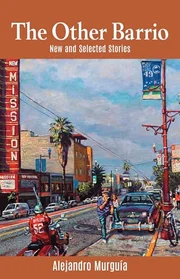Encompassing works published from 1975 to 2013, this collection by Murguía reflects a flinty but compassionate sensibility, focused on people struggling on society’s lower rungs, especially in the Bay Area. The title story exemplifies the approach, narrated by a San Francisco building inspector investigating a fatal Mission District fire; the story encompasses the narrator’s personal heartache, a gentrifying community, and civic corruption in sharp, noirish language. (“The other barrio” is a euphemism for death.) The settings may vary—the Mexican film industry in “Boy on a Wooden Horse,” a Day of the Dead festival in “Ofrendas,” a Half Moon Bay dive bar in “El Último Round”—but the mood is typically dark, focused on the narrators’ past losses, usually romantic ones. A number of the pieces are short, little more than sketches, but when Murguía uses a wider canvas, he reveals some winning hard-luck characters: The narrator of “A Toda Máquina” has been working to stay sober, but a chance encounter with a woman at a Sacramento, California, convenience store sets him unraveling. These characters are at once shaped and undone by old-fashioned masculinity, from the hard-edged young men in “Winnemucca Barbershop” to the veteran dance instructor in “A Lesson in Merengue.” The sad-sack men can get repetitively gloomy (“If women are a puzzle, this one had a thousand mismatched pieces,” the “Máquina” narrator laments), but there are some welcome outliers: “Bye-Bye Vallarta,” about a woman changing her life’s direction while on a trip to Mexico; “A Subtle Plague,” a kind of ghost story about gentrification; and the sinuous closing prose-poem, “A Sentence,” interweaving details of Latin American folklore and history with references to the lust and heartbreak that drive the author’s work.
Categories
THE OTHER BARRIO
